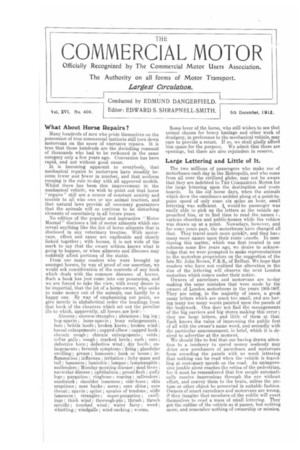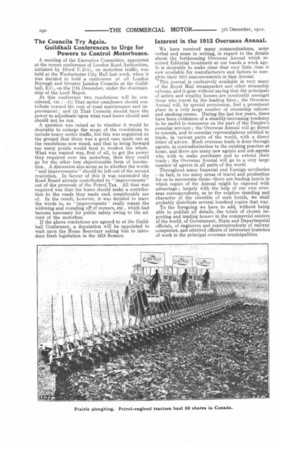What About Horse Repairs?
Page 1

Page 2

If you've noticed an error in this article please click here to report it so we can fix it.
Many hundreds of men who pride themselves on the possession of true commercial instincts still turn down motorvans on the score of excessive repairs. It is true that those hundreds are the dwindling remnant of thousands who had to be reckoned in the same category only a few years ago. Conversion has been rapid, and not without good cause. it is becoming apparent to everybody, that mechanical repairs to motorvans have steadily become fewer and fewer in number, and that uniform running is the rule to-day with all approved models. Whilst there has been this improvement in the mechanical vehicle, we wish to point out that horse "
repairs" still are a source of constant anxiety and trouble to all who own or use animal traction, and that natural laws provide all necessary guarantees that the animals will BO continue to be disturbing elements of uncertainty in all future years.
No edition of the popular and instructive "Motor Manual" discloses a list of motor ailments which can reveal anything like the list of horse ailments that is disclosed in any veterinary treatise. With motorvans, effect and cause are explicable and closely linked together ; with horses, it is not wide of the mark to say that the owner seldom knows what is going to happen, or when ailments and illnesses may suddenly affect portions of the stable.
From our many readers who were brought up amongst horses, by way of proof of our assertion, we would ask consideration of the contents of any hook which deals with the common diseases of horses. Such a book has just come into our possession, and we are forced to take the view, with every desire to be impartial, that the lot of a horse-owner, who seeks to make money out of the animals, can hardly be. a happy one. By way of emphasizing our point, we give merely in alphabetical order the headings from that hook of the chapters which set out the peculiar ills to which, apparently, all horses are heir:— Abscess ; abscess-strangles ; abrasions ; big leg ; bug-spavin ; bone-spaNin ; bony enlargements ; hots ; brittle hoofs ; broken knees ; broken wind ; bursa! enlargements ; capped elbow ; capped hock ; chronic cough ; chronic enlargements ; colds ; collar galls ; cough ; cracked heels ; curb ; cuts ; defective, horn ; defective wind ; dry hoofs ; enlargements; feverish symptoms; firing; glandular swelling ; grease ; humours ; husk or hoose ; inflammation ; influenza ; irritation ; itchy mane and tail • lameness ; laminitis ; lampa,s; lymphangitis ; mallenders ; Monday morning disease ; mud fever ; navicular disease ; ophthalmia; proud flesh ; palfy legs ; purgation ; ringbone ; roaring ; sallenders ; sandcrack ; shoulder lameness ; side-hone; skin eruptions ; sore backs ; sores ; sore shins ; sore throat ; spavin ; splint ; sprains of tendons ; stifle lameness ; strangles ; super-purgation ; swellings ; thick wind ; thorough-pin ; thrush ; thrush specific ; touched wind ; water furry ; weed ; whistling ; windgans ; wind-sucking ; worms. Some lover of the horse, who still wishes to see that animal chosen for heavy haulage and other work of drudgery, in preference to the mechanical vehicle, may care to provide a, retort. If so, we shall gladly afford him space for the purpose. We admit that there are openings, but there are also rejoinders in reserve.
Large Lettering and Little of It.
The two millions of passengers who make use of motorbuses each day in the Metropolis, and who come from all over the civilized globe, may not be aware that they are indebted to THE COMMERCIAL MOTOR for the large lettering upon the destination and route boards. In the old horse days, when the animals which drew the omnibuses ambled along at a point-topoint speed of only some six miles an hour, small lettering was sufficient. 4 would-be passenger was easily able to pick up the letters as the vehicle approached him, or to find time to read the names various churches and public-houses while the vehicle was drawn up at a point. Nowadays, however, and for some years past, the motorbuses have changed all that. They travel much more quickly, and they hay,: many more names upon their route boards_ In mentioning this matter, which was first treated in our columns seine five years ago, we desire to acknowledge that we were prompted to make representations to the motorbus proprietors on the suggestion of the late Mr. John Brown, F.R.S., of Belfast. -We hope that readers who have not realized the alteration in the size of the lettering will observe the next London motorbus which comes under their notice.
Owners of parcelears and motorvans are to-day making the same mistakes that were made by the owners of London motorbuses in the years 1905-190T. They are using, in the majority of cases, a gre4t many letters which are much too small, and are having many too many words painted upon the panels of the bodywork. One does not find the managements of the big carriers and big stores making this error'; they use large letters, and little of them at that. Each knows the value of impressing the public first of all with the owner's name word, and secondly with the particular announcement, in brief, which it is desired to advertise at the moment.
We should like to feel that our having drawn attention to a tendency to spend money uselessly may deter new purchasers of pareelears and motorvans from crowding the panels with so much lettering that nothing can be read when the vehicle is travelling at customary speeds on the road. An unimpressive jumble alone reaches the retina of the pedestrian, For it must be remembered that few people automatically receive impressions through the eye without effort, and convey them to the brain, unless the picture or other object be presented in suitable fashion. Owners of smart oarcelears and motorvans are wrong, if they imagine that members of the public will exert themselves to read a mass of small lettering. They get the outline of the vehicle as it passes, but nothing more, and remember nothing of ownership or mission.
The Councils Try Again.
Guildhall Conferences to Urge for Powers to Control Motorbuses.
A meeting of the Executive Committee, appointed at the recent conference of London Road Authorities, initiated by Ilford U.D.C., on motorbus traffic, was held at the Westminster City Hall last week, when it was decided to hold a conference of all London Borough and Greater London Councils at the Guildhall, LC., on the 17th December, under the chairmanship of the Lord Mayor. At this conference two resolutions will be considered, viz. : —(1) That motor omnibuses should contribute toward the cost of road maintenance and improvement ; and (2) That Councils should have the power to adjudicate upon what road buses should and should not be run.
A question was raised as to whether it would be desirable to enlarge the scope of the resolutions to include heavy motel' traffic, but this was negatived on the ground that there was a good case made out as the resolutions now stood, and that to bring forward too many points would tend to weaken the whole. What was wanted was, first of all, to get the power they required over the motorbus, then they could go for the other less objectionable form of locomotion. A discussion also arose as to whether the words "and improvements" should be left out of the second resolution. In favour of this it was contended the Road Board already contributed to "improvements" out of the proceeds of the Petrol Tax. All that was required was that the buses should make a contribution to the roads they made such considerable use of. In the result, however, it was decided to leave the words in, as " improvements " really meant the widening and rounding off of corners, etc., which had become necessary for public safety owing to the advent of the motorbus.
If the above resolutions are agreed to at the Guildhall Conference, a deputation will be appointed to wait upon the Home Secretary asking him to introduce fresh legislation in the 1913 Session.
Interest in the 1913 Overseas Annual.
We have received many communications, some verbal and some in writing, in regard to the details about the forthcoming Overseas Annual which received Editorial treatment at our hands a week ago. It is desirable to make clear that very little time is now available for manufacturers and factors to complete their 1913 announcements in that Annual.
This journal is exclusively available in very many of the Royal Mail steampacket and other steamship saloons, and it goes without saying that the principals of active and wealthy houses are constantly amongst those who travel by the leading lines ; the Overseas Annual will, by special permission, find a prominent place in a very large number of steamship saloons and smoking-rooms. During the last few years, there have been evidences of a steadily-increasing tendency to be useful to commerce on the part of the Empire's consular services ; the Overseas Annual will go direct to consuls, and to consular representatives entitled to trade, in various parts of the world, with a direct letter of advice. Much overseas trade is done through agents, in contradistinction to the existing practice at home, and there are many new agents and sub-agents who wish to make purchases and to extend their trade ; the Overseas Annual will go to a very large number of agents in all parts of the world.
Throughout many Imperial and Foreign territories —in fact, in too many areas of travel and production for us to enumerate them—there are leading hotels in which copies of the Annual might be exposed with advantage ; largely with the help of our own overseas correspondents, as to the relative standing and character of the clientele of such hotels, we shall probably distribute several hundred copies that way. To the foregoing we have to add, without being able to publish all details, the totals of chosen importing and trading houses in the commercial centres of the world, of Government, State and Departmental officials, of engineers and superintendents of railway companies, and selected officers of interested branches of work in the principal overseas municipalities.


























